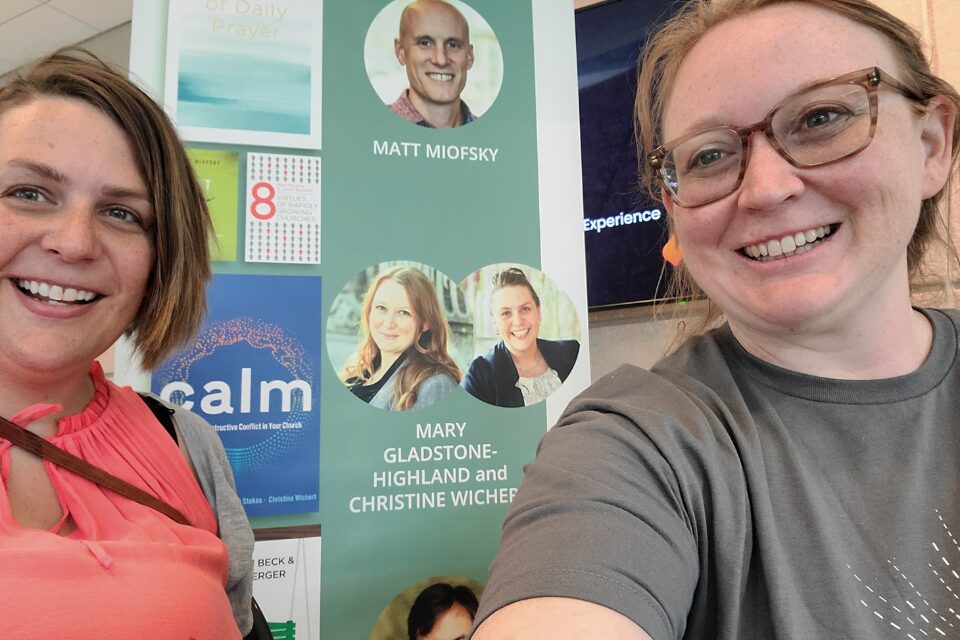Mary Gladstone-Highland reflects on how the Michigan Conference of the United Methodist Church has shaped her advocacy for LGBTQ justice and inclusion.
JAMES DEATON
Content Editor
General Conference deals with many policy matters affecting The United Methodist Church, and caucuses and other advocacy groups spend time on the margins educating delegates on causes they’re passionate about and trying to influence legislation.
As a United Methodist lay woman, Mary Gladstone-Highland finds advocacy work deeply fulfilling. It’s become her calling. Her formation in the Michigan Conference has significantly impacted her advocacy work in the church, first working for the general church for 12 years and now as a board member of Reconciling Ministries Network.
Reconciling Ministries Network (RMN) is a United Methodist advocacy group that seeks full equality of LGBTQ individuals in the life of the Church. RMN has been at the 2024 General Conference, raising awareness of justice-seeking legislation, especially the legislation that seeks to remove exclusionary language against LGBTQ people from the Book of Discipline.
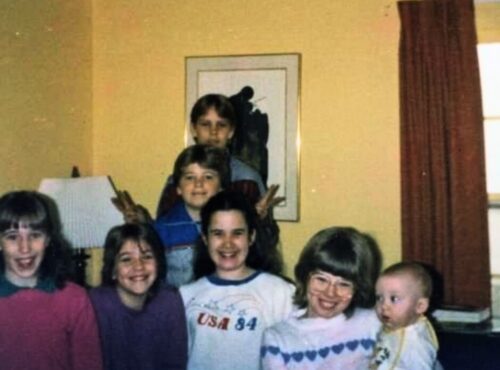
Mary grew up in the Michigan Conference as a double pastor’s kid (PK), with both parents being clergy. Her brother, Carl, is an ordained deacon. She was also a part of district and conference youth leadership, which formed her faith journey and how she articulated it, and was a member of the Wesley Foundation at Western Michigan University.
Although Dearborn: First UMC is where she attends regularly, she considers the Michigan Conference as her “home church.” From the congregations her parents led to the youth leaders who encouraged her own leadership and growth to the many clergy and lay friends she has all over the conference, the conference has shaped her faith and ministry. She was formed by the lived experience of what community can do.
Mary did not desire ordination, but she was inspired by leaders in the Michigan Conference who mentored and modeled advocacy. “I had church leaders who were open and willing to have conversations and speak for justice,” says Mary. “Every clergy member along the way said to go work for justice. Go be a US-2.”
And so Mary did. She felt the Holy Spirit lead her to serve The United Methodist Church, first as a young adult US-2 Global Mission Fellow and then as a Church and Community Worker for twelve years. She was the development director for Deaf Shalom Zone, working with Bishop Peggy Johnson at Christ UMC of the Deaf, then with Utica Eastside Mission and their refugee population, and finally with Clarkston UMC here in Michigan as community outreach director.
This experience working for The United Methodist Church was faith-fueled advocacy at the core. Mary explains, “I’ve had a lot of situations where I’ve been in communities like the deaf community or the refugee community or working with individuals living in poverty, where I have had to be very intentional about building relationships with folks and learning about lived experiences that are different than mine. And so that has made me more of an advocate for human rights and justice in general.”
In 2020, Mary was drawn to join Reconciling Ministries Network’s board and advocate for LGBTQ persons in The United Methodist Church.
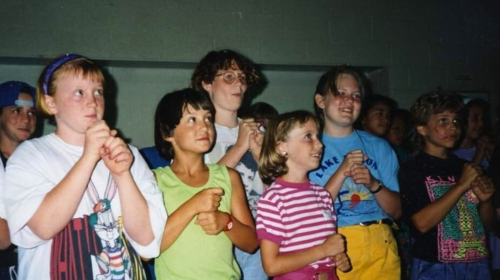
Conversations and debates around LGBTQ inclusion have been part of church gatherings for as long as she can remember. She talks about friends and family members speaking up at the Michigan Annual Conference for those excluded and harmed by church policies. But when legislation failed to move the church toward justice, she began to see friends leave.
“People that I was in youth leadership with left the church. I saw people that I knew very closely who were young adults in staffing positions in the church leave because of this issue. That was very sad because I have experienced a lot of meaningful community and support through The United Methodist Church. And to know, at the same time, that this same church was harming and excluding people who were very close to me was a contradiction.”
This caused Mary to step away from working for the church following the 2016 General Conference when delegates did not advance legislation regarding LGBTQ inclusion.
But joining RMN has given her the space to continue being connected to The United Methodist Church while aligning with her beliefs of faith and desire to support these advocacy efforts. “I want better,” she says. “I want more people to experience the goodness of the church, so joining RMN felt sincere,” she says, “and attending a Reconciling Church like Dearborn: First UMC has felt like a good and right decision.”
Mary is grateful for the leadership of the Michigan Conference and their support of a more inclusive church, ordaining LGBTQ persons, and the holy space they’ve provided for people to grapple with these matters. Following the special 2019 General Conference, when the Traditional Plan affirming bans on ordaining LGBTQ clergy and officiating at or hosting same-sex marriage passed, she remembers Bishop David Bard holding intentional meetings after Annual Conference that year to bring people together to talk about what that meant for our church.
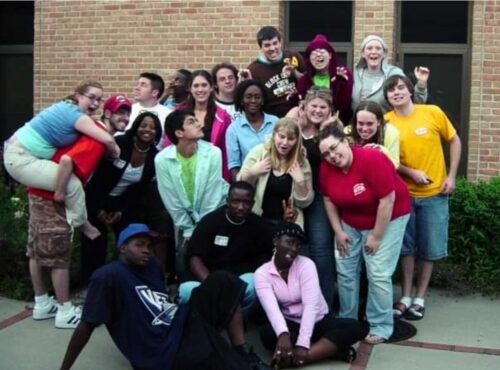
However, Mary says there’s still hard work to be done in congregations, even as the 2024 General Conference reverses some of The United Methodist Church’s longtime restrictions against LGBTQ members. Voting will not magically open the doors wide, create a culture of inclusion, or erase the trauma many have experienced. Mary wonders how we can become intentional about creating the church we want rather than just trying to maintain the same structures and bureaucracy as a conference and a denomination.
She continues, “How do we create a church that is vibrant and meaningful and open to innovation? One of the things I’ve found myself saying a lot lately is, ‘I don’t need a big church. I recognize that I’m living in a declining church, and yes, that’s scary, but I don’t need a big church. I need a meaningful church. I need one that’s sincere, one that’s doing good in the world, one that is creating community. And I hope we can focus on the right things so that we can get to that expression of faith.”
Advocating through her involvement with Reconciling Ministries Network is one way Mary stays connected to The United Methodist Church. She says that RMN can help congregations navigate those necessary but hard conversations about inclusion and how to create safe, welcoming places for all of God’s children. RMN can help churches answer such questions as: How can we share an inclusive church with our communities? How do we respectfully and confidently talk about gender pronouns in church settings? How do we stand up for LGBTQ people in our church?
According to Mary, congregations should still consider becoming a Reconciling Church to embrace LGBTQ persons in their church and community more fully. This designation given by RMN sends a clear signal that all are welcome. “From a justice point of view,” she notes, “it is way past time. You must make a stand for people who are queer.”
Despite past experiences at General Conference and the pain she’s felt for her friends and colleagues, Mary has a lot of hope in her heart. The Michigan Conference’s inclusive stance gives her hope. What’s happening at the 2024 General Conference gives her hope. Young adult clergy and lay friends who have a clear picture of the church they want to build and are working hard to continue to see that into fruition give her hope. (Click here to read some of their stories.) And her local church gives her hope.
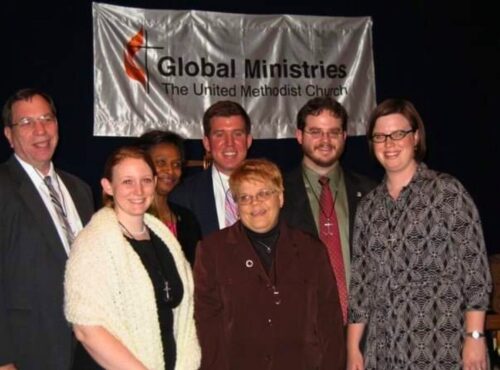
“I also feel hope,” says Mary, “in my local church, Dearborn: First. For three months out of third grade, my son chose to use different pronouns. We took that to our church, and they immediately used different pronouns for him in Sunday school. That was a test of our faith community, and they passed. And so, I feel safe there with my kids no matter how they identify or who they love. I feel hope in taking my kids to church and in them being a part of the children’s choir. I feel hope despite everything that’s going on.”
No matter what transpires during this historic General Conference, Mary hopes we start to send a new message of who we are and what God calls us to be. “I hope we can write a narrative where people who left the church or have not been a part of a church become curious about The United Methodist Church because of our expression of love to the community, rather than headlines that we’re continuing to argue. Being a narrative of love is an exciting future to think about.”
This narrative of love has held Mary and shaped her faith and calling. Once General Conference ends, she will continue to work for inclusion and justice from the margins. She’s grateful for how the Michigan Conference and the denomination have formed her and wants that for others.
“I cannot imagine a world where The United Methodist Church is not a part of my history and future. It’s been embedded in everything. Sometimes, I reflect on everything that’s happened to me in life — all the good stuff, all the doors that have opened, all the saints like Bishop Peggy Johnson — has been because of The United Methodist Church.”
Last Updated on May 3, 2024

